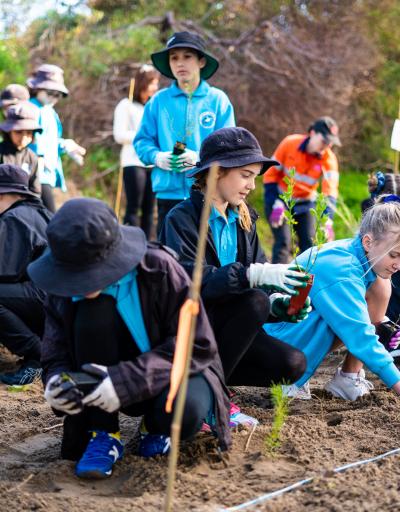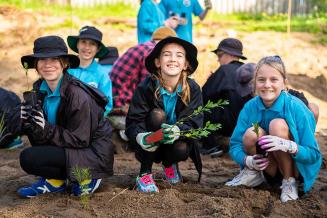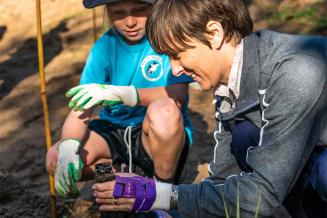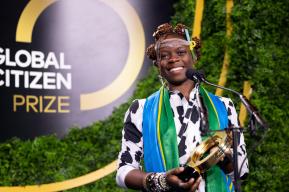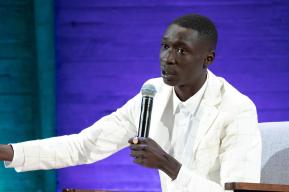In Perth’s quiet suburb of Padbury, Western Australia, Environmental Researcher Grey Coupland is giving rise to a green transformation, one school at a time, by planting Miyawaki forests.
The Miyawaki concept traces back to the 1970s, when Japanese Botanist Akira Miyawaki witnessed the decline of forests across Japan. Yet amidst this ecological distress, he noticed resilient pockets of primary forest surrounding temples and shrines. Inspired by these natural wonders, he crafted the Miyawaki method, planting mini forests across Japan and Southeast Asia. It was this concept that ignited Grey Coupland's imagination. On the UNESCO Green Citizens podcast, Grey recalls the moment she came across the concept, realising the potential to immerse children in nature through hands-on environmental stewardship. Equipped with a PHD in Ecology, Grey pitched the idea to a local school principal, and the UNESCO Green Citizens project Miyawaki forests for urban schools was born.
Through the podcast's vivid storytelling, we join Grey and a troop of eager schoolchildren in planting their inaugural mini forest. Together, they developed a compost from food waste which they use to replenish the soil, fostering a cycle of learning and growth. Since then, the concept has spread to multiple schools, engaging thousands of children who watch their forests grow, monitor them, and discover the range of insects, invertebrates and birds that have adopted the spaces as their habitats. For many Padbury children, it's a chance to discover and connect with the natural world for the first time, and to reduce the effects of climate anxiety.
[Children] are going to be the custodians of the world and we need to make sure that they’re invested in nature, because you can’t fight for something unless you care for something.
The impact of these Miyawaki forests extends far beyond education. By conducting meticulous botanical surveys of remnant forests, Grey and her team craft unique havens of biodiversity, planting flora that was native to each area before urbanisation. These urban oases cool the cityscape and serve as a powerful weapon against climate change, by absorbing carbon and breathing life into cities. Extending their community impact, the project collects food waste from local businesses to use it as compost for soil, divert it from going into landfill, and thereby reduce carbon emissions.
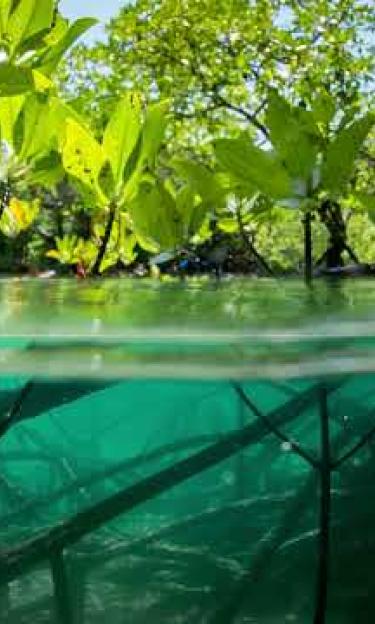
Listen to Grey’s full story on the UNESCO Green Citizens podcast
How can these urban forests have a wider impact on climate change? As the podcast delves deeper into the significance of green spaces in urban settings, Meriem Bouamrane, Chief of Ecology and Biodiversity for UNESCO, sheds light on their multifaceted benefits. From rooftop gardens to sprawling parks, green spaces can play a pivotal role in shaping sustainable cities of the future and encouraging us to reconnect to nature.
It is more and more widely known that the more green areas or systems we have in our cities[...] the better the climate conditions are. Not to mention the increased benefits of pollination, cooling and many other advantages that plants have to offer.
In this episode, Meriem shares her hope that we will completely reconsider how we inhabit earth, especially in cities, where ecological challenges are the most acute. By promoting urban forests and encouraging more sustainable habitats, enhancing the biodiversity that is on our doorstep, she believes we can be closer to achieving this goal. Tune in to this episode to discover the magic of Miyawaki forests that are greening cities for our future generations.
These podcasts were made possible thanks to the support of Radio France and the Klorane Botanical Foundation.
What is UNESCO Green Citizens?
This initiative connects local citizen solutions, UNESCO's scientific expertise, and the willingness of young people to engage in the fight against climate change. Learn more about these 150 innovative and duplicable projects, led by citizens, below.


